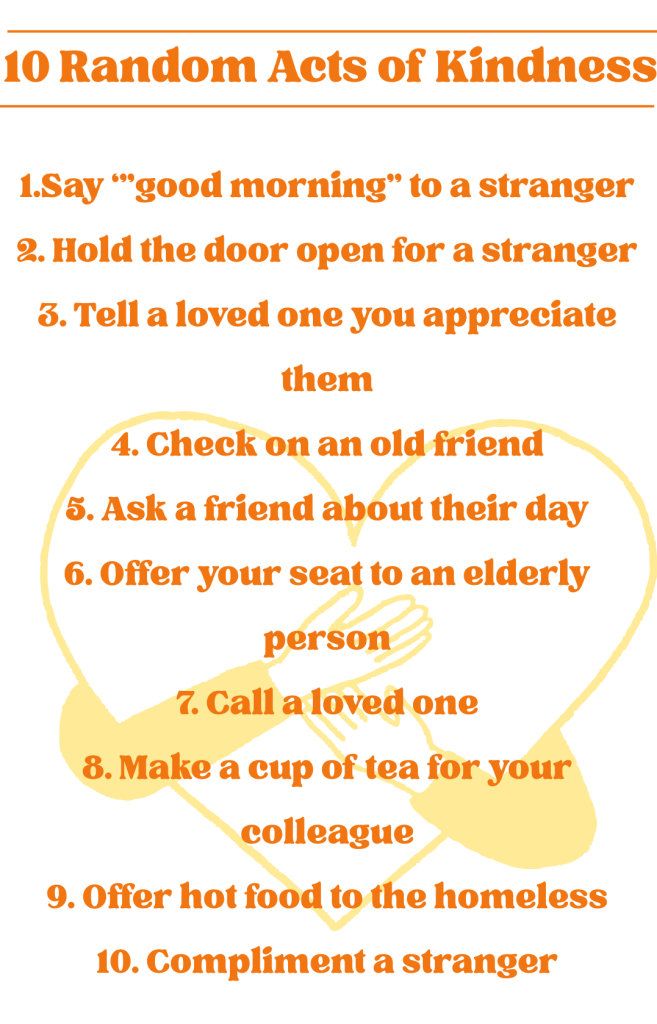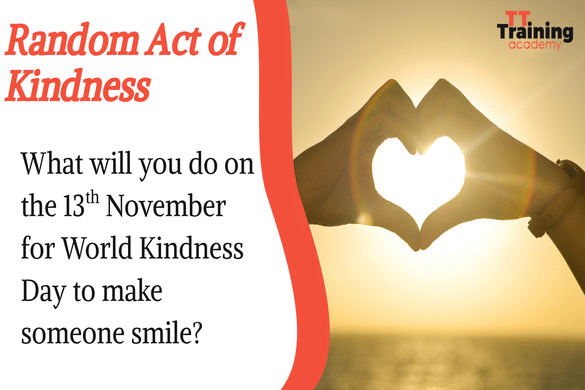
Did you know that practising Random Acts of Kindness can boost your mood, improve your health, and even help you live longer? Research consistently shows that daily acts of kindness not only strengthen communities but also enhance our own emotional well-being. These small, selfless actions have a truly significant impact — for both the giver and the receiver.
What Are Random Acts of Kindness?
Random Acts of Kindness are simple, thoughtful gestures that brighten someone else’s day — and often your own. From holding the door open to sending a kind message, these acts of generosity can reduce stress, improve mental health, and foster stronger human connections.

Each of these Random Acts of Kindness has the power to create connection and joy — often when people need it most.
The Science Behind Random Acts of Kindness
Hormones and Happiness
Engaging in Random Acts of Kindness triggers the release of oxytocin, also known as the “love hormone.” Oxytocin enhances social bonding, lowers blood pressure, and promotes heart health. Being kind can literally protect your heart — both emotionally and physically.
Kindness also boosts serotonin, the “feel-good” hormone that increases happiness and reduces symptoms of depression and anxiety.
Kindness Reduces Stress
Performing Random Acts of Kindness helps regulate cortisol — the stress hormone. The calming effects of oxytocin can counteract stress, leaving you feeling more relaxed, peaceful, and emotionally balanced.
Kindness and Longevity
Kindness has a ripple effect that extends beyond emotions. Research suggests that regular Random Acts of Kindness can reduce the risk of chronic illnesses, improve heart health, and even extend lifespan.
World Kindness Day – November 13th
Every year on November 13th, people around the world celebrate World Kindness Day, a reminder to “pause for kindness.” First introduced in 1998, the day encourages everyone to integrate Random Acts of Kindness into their lives — not just once a year, but every day.
Don’t Forget Self-Kindness
Kindness is a two-way street — being kind to yourself is just as important.
Try these self-kindness practices:
- Give yourself a break: Be compassionate, forgive yourself, and silence your inner critic.
- Live healthily: Get enough sleep, eat nourishing foods, and prioritise rest.
- Practise mindfulness: Be present in the moment — a simple but powerful way to nurture your mental well-being.
- Talk and connect: Share how you feel; a problem shared is a problem halved.
- Journal: Reflect and release emotions by writing down your thoughts.
- Celebrate yourself: Acknowledge your achievements and the progress you’ve made.
Your Kindness Challenge
We challenge you to perform three Random Acts of Kindness today:
- Smile at five strangers.
- Check in on a family member or friend you haven’t spoken to in a while.
- Compliment a colleague at work.
Key Takeaways
- Random Acts of Kindness are simple, generous gestures that benefit everyone involved.
- Science shows kindness reduces stress, boosts happiness, and supports heart health.
- November 13th is World Kindness Day — a reminder to make kindness part of every day.
- Don’t forget to practise self-kindness too!
Final Thought
Whether it’s a smile, a note, or a helping hand, every act of kindness counts. By practising Random Acts of Kindness, we not only lift others — we lift ourselves too.
FAQ’s
What is the most common Random Act of Kindness?
Holding the door open for someone — a small gesture that makes a big difference.
Is World Kindness Day always on the same date?
Yes, it’s celebrated annually on November 13th.
How can I show Random Acts of Kindness at work?
Do a coffee run, leave encouraging notes, or offer to help a busy colleague.



No Comments